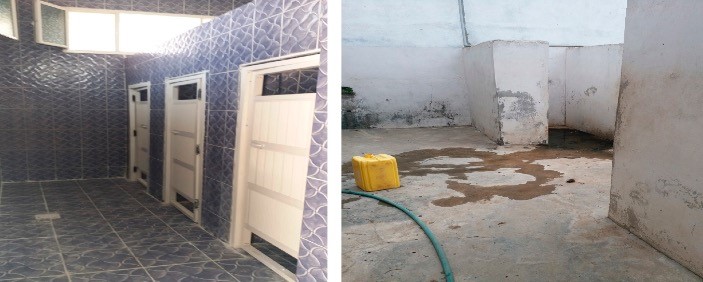300 persons - males and females - are the total number of patients of Dar-ul-Salam Psychiatry Hospital in the Governorate of Hodeidah. These are people who have been stripped of their normal behavior by the harshness of life and precarious living conditions, which also removed them from their normal social settings. The patients have been admitted into the hospital for treatment for mental disorders, and for rehabilitation and reintegration into society.
The current reality and conditions in Yemen has had a profound impact on the services the hospital normally provides to its patients. The hospital faces difficulties in providing sanitary conditions, safe, and healthy environment - water and sanitation.
In August 2017, during a field visits by the PWP to assess the needs of this neglected segment of society, it was found that the cholera outbreak had spread among the patients in the hospital. 54 cases of cholera were confirmed, and two had died as a result. 23 patients were displaced persons, including two women brought by their families from areas of conflict - specifically from the Governorate of Sa›adah.
Neglect
In spite of different services provided by the hospital, it doesn›t receive sufficient support to meet its needs - the hospital relies mostly on charitable people. The most acute problem the hospital was facing is the lack of sufficient water to meet the daily needs for personal hygiene for the patients, cleaning of wards and laundry – where bed sheets, bed covers and blankets…etc. have to be washed regularly. Other facilities in the hospital, such as the restaurant, need sufficient water supply to operate, but they had only few small plastic tanks insufficient to meet the needs. In addition, the hospital lacks sanitary and clean dormitories and bathrooms: The existing bathrooms are open with no roofs or doors. The bathrooms floors are hard uneven concrete with no tiles, and turn into water pools collecting wastewater, becoming swamps for contagious diseases and germs and a source of contamination and transmission of diseases between patients.
Lack of Hygiene
Mutay›a Ahmed al-Sagheer, a janitor, spoke about the situation in the hospital by saying:»The difficulties we are facing in dealing with patients and the lack of a safe and sanitary environment stems from the fact that we are dealing with a group of patients who have special needs. They need regular personal hygiene, clean and sanitary rooms, halls and dormitories - but this wasn›t possible for lack of sufficient water.»
He continued by saying:»We, sometimes, find out that a patient has urinated on themselves or on the floor of a room, or have fouled the walls. Some of the patients do it in the hall, right in front of the bathrooms. Some use the WC›s but not the toilette seats. We have patients who refuse to go to the WC›s because they are open with no roofs or doors, and can only go during certain times of the day… All of this require continuous follow-up and cleaning, and adequate water, hygiene and sterilization supplies. We lack all of that in the hospital, and this poses a major risk to the lives of the patients, given the spread of epidemics - such as the cholera outbreak.
Response by the PWP
The PWP intervened as part of the YECRP – funded by the World Bank and administered by the UNDP. It built an annex consisting of a number of public bathrooms and showers. The PWP also built a 50 cubic meter tower-tank and a chlorine unit to sterilize the water - as a contribution to help the hospital meet its needs and mitigate the spread of the cholera outbreak, especially since the hospital provides important services deserving of attention and patronage.
Mohamed Sinan Mohamed Ahmed, the administrative officer and supervisor in the hospital, spoke about the intervention by the PWP by saying:» (the intervention) will provide a safe and sanitary environment by making available regular water supply and better and cleaner WC›s than the previous ones, which were open and had hard concrete floors that were difficult to clean. The intervention will improve levels of cleanliness, the environmental impact, and the general appearance of the hospital.»
Brief History
The hospital was built in 1979, and serves the governorates of Hodeidah, Raymah, Hajjah, Mahweet, Sa›adah and parts of the governorates of Taiz, Sana›a and Dhamar.




